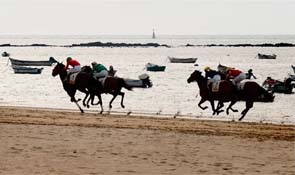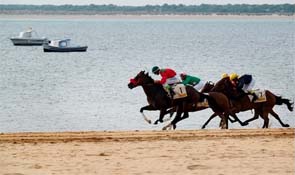Sanlúcar Horse Races
The Sanlúcar Horse Races are a long-standing tradition that dates back to 1845, in an attempt of the locals to create a similar event as the races which were held in England.
Origin

The origin of the races is unclear: one theory is that the local fish buyers used to race their horses along the beach as they waited for the boats to bring in the fish to the port. Other story is that people used to race donkeys along the beach banks for fun, and at some point they went on to use horses for that purpose.
A society was created under the name of Sociedad de Carreras de Caballos de Sanlúcar de Barrameda to give an impulse to this sport in the south of Spain. Although there is a precedent of these “English-style” horse races in the town of Alameda de Osuna ten years earlier, the Sanlúcar Horse Races are considered to be the oldest of all those held in Spain, because the Alameda de Osuna version only lived through two more editions after their start, and the Sanlúcar races are more alive than ever.
Events

The races are organized by the same society that promoted the creation of the event together with the Town Hall of the town, and take place every other weekend of August, along Sanlúcar’s long beaches. The course is about 1,800 meters long, running along the banks of the mouth of the Guadalquivir river. The time for them to start is around six in the evening, when the tide is low, and the horses are able to race on the wet sand. More than 200 horses participate in these races, organized in 24 races of pure thoroughbred.
Although originally intended for the more aristocratic stratums, it has nowadays turned into a very popular event for which the whole village of Sanlúcar bends over backwards. There are then, various ways of enjoying the races: the spectators can either pay for a box seat with a shadow, or enjoy the races from the beach for free.
Once the races are over, a huge beach party is held, in which the whole village takes part, along with many curious and tourists. This puts an end to the celebration, probably in the very early hours of the next day…

 An English-style horse race that takes place on the wet sand of the southern beaches of Cadiz? A unique spectacle of beauty and nature the traveler shouldn't miss!
An English-style horse race that takes place on the wet sand of the southern beaches of Cadiz? A unique spectacle of beauty and nature the traveler shouldn't miss! 